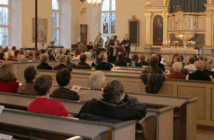Many Christians today feel tension between faith and politics, often confusing partisan allegiance with discipleship. Lovett Weems warns that Christianity’s credibility suffers when political power replaces Christlike love. True patriotism, rooted in Jesus’ teachings, values compassion, diversity, humility, and love.
Why, indeed, are so many Christians so cruel? This is the question David French said last December that he hears everywhere he goes. French, an evangelical Christian and a conservative columnist for the New York Times, laments that the public face of Christianity in the United States is represented by words and actions so contrary to the life and teachings of Jesus. More recently he reported that with the election of the new pope, the “most important American” in the world (not the most powerful) will be someone who proclaims and practices the way of love, forgiveness, and compassion taught by Jesus and represents our faith to the world more credibly.
July 4 is a season in which people of faith reflect upon their relationship both to their faith and their country. Many experience a disconnect today. That’s not unusual. Such a tension always exists, but some eras are more troubling than others. Most of us have long believed that patriotism for Christians is appropriate so long as it aligns with the way of Jesus. Part of American patriotism also includes celebrating the value of religious diversity where all enjoy their freedom to worship, and no groups seek to impose their religious will on others through political power. If we can learn anything about this challenge from Jesus, it is that the way of secular political might is always a dangerous temptation. Many church members are confused today. They are led by some to believe that certain religious beliefs are synonymous with particular political beliefs and vice versa. This is seldom the case.
When I was a pastor in Mississippi, often a church member would come to me and say, “Pastor, I’m a conservative!” My response was always, “Great. I hope you are the right kind of conservative.”
Less often but occasionally, other church members would tell me, usually after making sure no one else was within earshot, “Pastor, I’m a liberal!” My response was always, “That’s great. I hope you are the right kind of liberal.”
Few understood my response, and so that always began a thought-provoking conversation. They wanted to know what I meant by the “right kind” of conservative or liberal. I would explain I had known many church members over the years who appeared to be more conservative than Christian or more liberal than Christian. By that, I meant the principles of the Christian faith, including many of the words of Jesus, meant far less to those people than their favorite political commentator or politician.
My experience as a pastor was that often it was conservative people who led some of the most remarkable progressive change in Mississippi because they did not put their politics ahead of the claims of genuine discipleship. By the same token, many needed changes did not occur when those who intellectually supported the change were missing in action when the hard work of change was needed.
Again, David French’s words from a more recent column are helpful: “When you believe the success of your religion depends on the success of any politician, it’s only a matter of time before politics becomes your religion.”
There is remarkable consensus emerging outside of the narrow world of Christian nationalism about the difference between what Frederick Douglass once called the “Christianity of this land, and the Christianity of Christ.” Jesus Christ is our standard. Gregory E. Sterling, dean of Yale Divinity School, recently said that Christians do not have to agree on all aspects of what the teachings of Jesus Christ mean, but we can apply the test given in the Fourth Gospel: “I give you a new command that you love one another, just as I loved you, love one another. By this everyone will know that you are my disciples if you love one another” (John 13:34-35).
A patriotism that excludes anyone from God’s love and compassion always falls short for God’s people.
Related Resources
- Leading Amidst Christian Nationalism by Lovett Weems
- Leading Between Faith and Patriotism by Lovett Weems
- What Does Religious Freedom Mean Today? By Lovett Weems
-
Faithfully Engage Public Policy featuring Miranda Zapor Cruz — Watch the Leading Ideas Talks podcast video | Listen to the podcast audio version | Read the in-depth interview
If you would like to share this article in your newsletter or other publication, please review our reprint guidelines.






